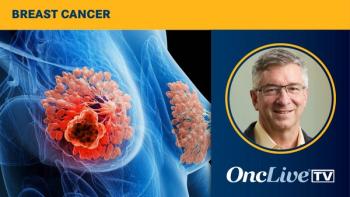
CDK Inhibitors in Metastatic Hormone-Driven Breast Cancer
Transcript:Kimberly L. Blackwell, MD: CDK inhibitors have really become a new standard of care for the way we manage recurrent or metastatic hormone-sensitive breast cancer. When added on top of an endocrine therapy backbone, we know that CDK inhibitors extend the duration of response to the endocrine therapies and are now well-proven in the context of both aromatase inhibitors and the SERDs (selective estrogen receptor degraders) like fulvestrant. So, they really have changed the practice, such that now we’re not just talking to women about getting a single endocrine agent if their cancer comes back. We’re really talking about endocrine therapy layered on top of a targeted agent, or you can think of it vice versa.
The rationale behind this is that endocrine therapy slows down the cell cycle, but that the cycle can continue if these cancer cells can still cycle in the presence of low estrogen levels. So, CDK inhibitors put another break on the cell cycle by inhibiting the retinoblastoma protein and its interaction with a transcription factor known as E2F.
E2F is probably not a targetable protein, meaning it’s so important to normal cell function that we probably won’t ever see a drug that directly targets E2F. But the CDK inhibitors, by inhibiting what’s called the phosphorylation of RB, when RB’s not phosphorylated, it’s tightly stuck to E2F and E2F can’t do what it needs to do. So, when E2F is shut down, the proteins that are necessary for cancer division can’t be made and the cell doesn’t cycle. It’s stuck in what’s known as G1 arrest.
It’s a cool concept in that the endocrine therapy slows the growth of the cancer cell down because you’re withdrawing the stimulus—in this case, estrogen. But cancer cells are smart, and they figure out how to continue to grow, maybe on a slower basis, in the absence of estrogen. So this is, in principle, a very synergistic combination, right? You withdraw the estrogen, the cells slow down their cycling, and then you inhibit the proteins that are necessary for cell cycling. It is a 1 to 2 punch in taking care of hormone-sensitive metastatic breast cancer.
Transcript Edited for Clarity




































